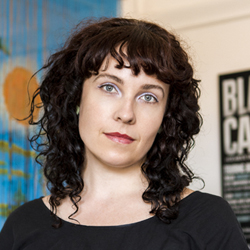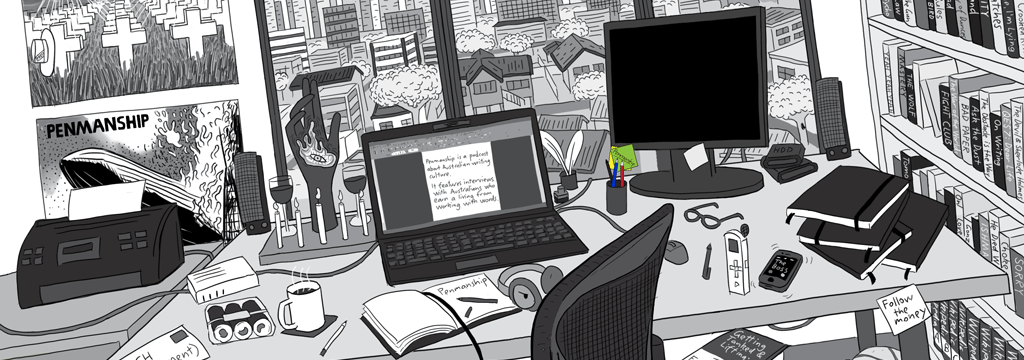Kate Hennessy is a freelance writer and editor.
 I first read Kate’s work in about 2009, when we were both contributors to the Australian music website Mess+Noise, where she was a critic and feature writer whose work I admired greatly from afar, since she was based in Sydney. It wasn’t until 2016 that we met for the first time, at the Rock & Roll Writers Festival in Brisbane, where we were both guest speakers. In the intervening years since I first saw her byline, Kate has worked as a music and arts critic for The Sydney Morning Herald, The Guardian Australia and The Quietus, among others, as well as travel writing for a range of Australian and overseas publications. Outside of freelancing, she works in corporate writing and editing, and teaches courses on music journalism and professional business writing.
I first read Kate’s work in about 2009, when we were both contributors to the Australian music website Mess+Noise, where she was a critic and feature writer whose work I admired greatly from afar, since she was based in Sydney. It wasn’t until 2016 that we met for the first time, at the Rock & Roll Writers Festival in Brisbane, where we were both guest speakers. In the intervening years since I first saw her byline, Kate has worked as a music and arts critic for The Sydney Morning Herald, The Guardian Australia and The Quietus, among others, as well as travel writing for a range of Australian and overseas publications. Outside of freelancing, she works in corporate writing and editing, and teaches courses on music journalism and professional business writing.
It was the latter skillset that brought Kate to Brisbane in mid-May, and we met at her hotel room so I could ask her a few questions over a bottle of white wine. Our conversation touches on how she learned to make boring things interesting while working for a corporate writing agency; why she decided to become a freelancer as she approached the age of 30, and how it turned out to be a perfect fit for her; why she received hate mail from a musician after writing about his band in The Sydney Morning Herald; why the supply-and-demand in the travel writing business is worse than in music journalism, and why she thinks live music is like sex.
Kate Hennessy‘s music and arts criticism appears in The Guardian, ABC Arts, Fairfax, Australian Book Review, Noisey, Limelight, Mess+Noise and UK magazines The Wire and The Quietus. Kate talks about arts on ABC TV and has spoken at Vivid Ideas, Darwin Writers’ Festival, the Rock & Roll Writers’ Festival, Bigsound and at live events for Sydney’s FBi Radio. Kate is an Australian Music Prize judge, a founding member of feminist collective LISTEN and a teacher of five years at the Australian Writers’ Centre. She developed a masterclass for The Guardian called ‘How To Be A Music Journalist‘, offered in Sydney and Melbourne, and as a festival workshop at Hobart’s Dark Mofo festival. Kate’s travel journalism has taken her to Africa, Papua New Guinea, Turkey, Solomon Islands, Germany, Peru, Taiwan and remote Indigenous communities in Australia. She has a Bachelor of Creative Arts (Creative Writing major) from Wollongong University and won a scholarship to the University of California, Berkeley, where she completed a double major in Political Science and History.
Kate Hennessy on Twitter: @smallestroom
Direct download | iTunes | Stitcher | Libsyn | YouTube
Timeline:
3.00 Kate is visiting Brisbane in May 2016 to teach business writing with the Australian Writers Centre, which she has been doing for more than four years
4.00 The course she’s teaching is called ‘Professional Business Writing‘, which in this case is an in-house course for a property developer client
6.00 “No writing comes easily to me […] I’m a really slow writer”
7.00 Dave Faulkner, songwriter and music critic for The Saturday Paper, recently paid Kate a huge compliment, saying that her work “reads like it just fell onto the page”
8.00 Kate’s 2013 feature review of The Drones’ album I See Seaweed for Mess+Noise took her many hours to write, and earned her $50
9.30 Kate’s music writing began while living in Oakland, California. She was a fan of a local rockabilly band called The Phenomenauts, whom she decided to write about for a print magazine called Independent Musician
13.00 “I was a journalist before I became a music writer, so I know about audience, and about writing to your crowd”
13.30 Kate says she was always going to be a writer; her first degree was in creative writing at Wollongong University, then switched to political science and history, and completed that degree at The University of California, Berkeley
14.30 On returning from a second stint living in the United States, in 2002, Kate ended up working for IT Journo and Media Connect, founded by Phil Sim; Kate joined as “a subeditor and data entry person”, then became a media writer
15.30 Kate began writing party stories for IT Journo, “kind of like a social column”, which she now realises were an early form of the live music reviews she would later write
16.30 The columns involved “a lot of colour, a lot of observation, and a lot of humour, because everyone was getting trashed”
17.30 Kate was later approached by The Editor Group, a corporate writing agency, where she worked as a writer and editor for two years
19.00 “I cut my teeth in corporate writing [by] writing press releases about routers”, where Kate “learned to make boring things interesting”
20.30 Kate later gravitated toward the corporate social responsibility field, where she ended up getting a job consulting in that area before becoming a freelancer
21.30 Earlier, Kate did shift work for Media Monitors, now known as iSentia, a high-pressure role where she did summary writing for a range of clients from 4.00am onwards
26.00 “If there was ever a time in my life where I could have got really depressed, it would have been when I was doing night shift, for sure”
27.00 Kate isn’t great at listening to music while she’s writing or working
28.00 When working at The Editor Group, Kate’s go-to music was an album named Sex, by Australian instrumental jazz trio The Necks
30.00 Kate’s decision to become a freelancer came as she was nearing the age of 30, and questioning her future
31.00 “I was a shitkicker. I worked such crappy jobs. I had no green card when I lived in America […] I always felt grateful to have a job and be earning money”
33.00 While writing for The Sydney Morning Herald, Kate wrote a negative review of a Sydney band’s album, and received hate mail from a male artist, “who was absolutely livid that I had negatively reviewed his band”
34.30 In amongst his scathing criticism of her, the artist referred to Kate as “high and mighty lord of the pen”, which she loved and decided to use for her Twitter profile description
36.00 “To be completely self-aware and honest, I do regret the way I brought the album down. I don’t believe I needed to do it in that way”
37.30 Soon after that experience, Kate came across a quote by German composer Max Reger, who responded to a negative critic’s review by writing, “I’m in the smallest room in the house. Your review is before me, but soon it will be behind me”, which inspired the name of Kate’s website The Smallest Room
40.00 Kate’s cousin introduced her to Birthday Letters by Ted Hughes, a book which sparked her desire to become a critic due to the excerpted review on the back cover by Seamus Heaney, “which was so fucking beautiful, I couldn’t believe it”
43.00 Kate was particularly struck by Heaney’s closing phrase “the impression of utterance, avalanching towards vision“, which to her mind is a perfect summary of Hughes’s book
46.00 When Kate began freelancing in 2007, finding a steady income wasn’t an issue, because she had many editorial contacts in the industry thanks to her previous roles
48.00 Kate’s random freelance jobs include writing quiz questions for a Channel Seven kids’ game show, annual reports, and environmental case studies for Sydney Theatre Company; she currently has more freelance work than she can handle, and is constantly looking for reliable people to recommend to her clients
52.00 A year or two ago, The Guardian Australia asked Kate to review a dance show named Nothing To Lose. This led to reviewing ballet-style dance, “which felt a long way from my centre of expertise, but it seemed to go okay!”
53.30 Kate says she has “impostor syndrome, this feeling that you’re just about to be discovered as a fraud […] feeling like you’re actually not perhaps the person who should be doing the job you’re doing”
55.30 “I oscillate between self-doubt and confidence; that’s the classic creative paradigm, and that’s what most creative people have. If you don’t, the self-doubt is what gets you moving, and gets you agitating. Those insecurities pull you to get better”
57.00 How Kate went about reviewing dance shows for The Guardian, despite it being something that she did not have a lot of expertise or knowledge of
58.00 She started reading other Australian dance critics, to compare their styles to hers, and realised that she was doing it just as well as they were
59.30 For Kate, live music is like sex, because “it’s inarguable; it either does it for you, or it doesn’t. There’s no arguing with that. It’s a bodily response”
64.00 “It’s such a practice in honesty, and that’s what I love about criticism. It’s one of the most honest jobs, because unless you go with your instinct and your belief, you can’t do it. You get lost”
66.00 Kate’s primary music criticism at present is ‘Music You Missed‘, a quarterly round-up of recent Australian releases for The Guardian
67.00 Why Kate likes to take albums for a walk while formulating her thoughts ahead of writing a review
69.00 In April 2016, Kate wrote a review of Sydney producer Gentleforce for The Guardian, which led to global sales for him, and triggered him to send an effusive and grateful note of thanks
73.00 “I felt like it made it all kind of worth it, in a way […] It was so heartfelt, and he’s a true creator of music. I thought, ‘wow, I’ve made a difference for him, and it’s nice'”
75.00 Kate began travel writing as an independently funded freelancer, as opposed to the fully-funded “famil” junkets that tourism agencies often send writers on
76.30 “You can get really screwed around, because the supply and demand situation is almost more grievous than it is with music journalism: everyone wants to do it”
77.00 In late 2015, Kate went to Papua New Guinea at short notice for an Australian magazine, completed the photography and reporting and filed her story, only to be told that the magazine decided not to publish her work due to an advertising disagreement
79.00 “Eventually, I managed to get another publisher, but I don’t think that kind of thing would be rare [in travel journalism]”
80.30 “This is the problem with travel writing: if you’re a traveler, everything becomes a research trip”
81.00 In September 2015, Kate wrote about Garma Festival for AWOL; the trip was partially funded by Qantas and the festival itself, which was in a remote location
85.00 “I’ve got too much respect for Aboriginal culture to think that I can inhale it, then breathe it out in an article. And that applies across all my travel journalism”

